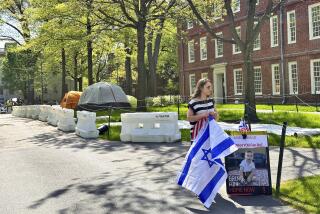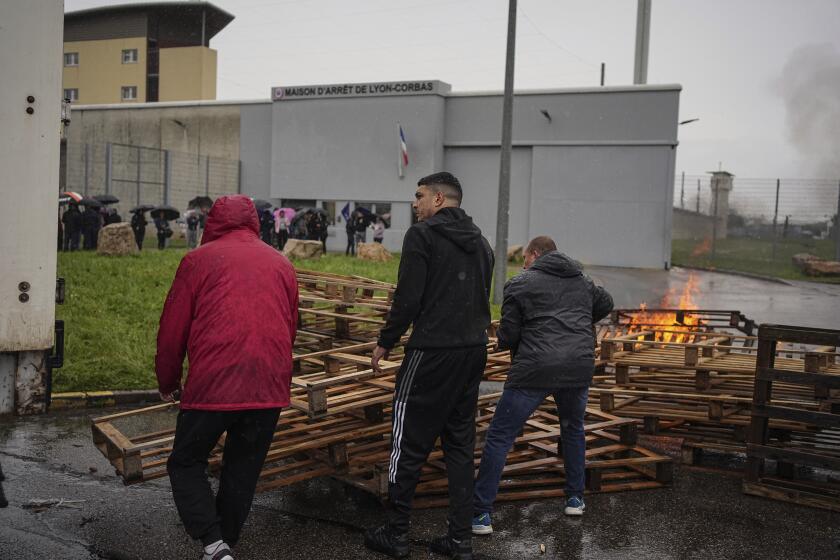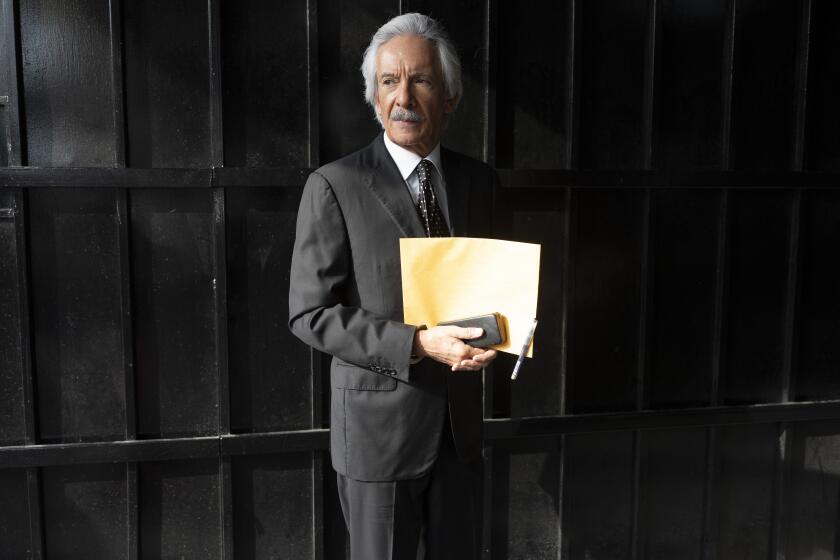Iraqi Leader Defends Attack
Iraq’s interim prime minister on Sunday defended a U.S. missile attack on the city of Fallouja that left 22 people dead and said he planned to restructure Iraqi security forces to help battle a stubborn insurgency.
But leaders of a U.S.-appointed security force in the city 40 miles west of Baghdad complained that American troops had undercut their authority by launching the strike against a suspected terrorist cell without informing or consulting them.
U.S. officials have maintained that the target of the strike Saturday was a building housing insurgents loyal to Abu Musab Zarqawi, a Jordanian-born militant accused of masterminding a string of terrorist assaults.
At a news conference here, interim Prime Minister Iyad Allawi said he was notified of the attack only shortly before it occurred and, as of Sunday afternoon, had been given few specific details about the strike. But he asserted that the Americans had hit their intended target.
“We know that a house which had been used by terrorists has been hit,” Allawi told reporters. “We welcome this hit on terrorism anywhere in Iraq.”
While praising U.S. efforts to root out insurgents, he indicated that he expects closer consultation after his interim government takes power from the U.S.-led coalition. “This pattern will change once sovereignty is transferred,” he said.
The Arabic-language television network Al Jazeera, meanwhile, aired a videotape on Sunday purportedly showing a South Korean hostage in Iraq pleading for his life and asking for his nation’s troops to leave the country.
His kidnappers, who identified themselves as belonging to a group led by Zarqawi, gave South Korea 24 hours to meet their demand. Otherwise, they said, “we will send you the head of this Korean.”
The hostage was identified as Kim Sun Il, 33, an employee of South Korea’s Gana General Trading Co., a supplier for the U.S. military.
The South Korean government announced today that there was no change in its policy on sending troops to Iraq.
Members of the Fallouja Brigade, a security force led by former officers from Saddam Hussein’s army, criticized Saturday’s missile attack.
“We were supposed to be consulted ... so as to be able to do our duty,” said Brig. Gen. Mohammed Abid Dulaimi of the Fallouja Brigade. “We would have been able to uncover any suspicions in this respect and would have done our security duties.”
The criticism underscored the challenges the United States faces as it attempts to hand over sovereignty to new Iraqi institutions while maintaining a massive military presence.
It also raised questions about the U.S. military’s relationship with the Fallouja Brigade, which includes some of the insurgents who battled U.S. Marines in the city during the spring.
Other members of the local security forces expressed similar outrage.
“This situation constitutes a big embarrassment for us, being a security service,” said Fallouja’s police chief, Col. Sabbar Janabi. “We would hope that a certain degree of coordination with the people of Fallouja should have been done.”
Community leaders and Iraqi security officials also repeated their condemnations of the U.S. missile strike. Dulaimi said an inspection of the rubble from the two houses demolished in the strike had turned up only civilians.
“It was obvious that the victims were merely Iraqi family members. We saw women and children,” he said. “There was no justification for this surprising attack, for there wasn’t a single person related to Zarqawi.”
The Fallouja Brigade was introduced in early May under former Iraqi army Gen. Mohammed Latif to end a three-week siege of the deeply anti-American city. The unit was charged with quieting insurgent activity and rounding up those responsible for the killing and mutilation of four American security contractors on March 31.
U.S. officials declined to comment on whether they consulted with local Iraqi officials before launching the attack.
In recent days, American military leaders have expressed frustration with the brigade’s performance, saying it has allowed insurgent activity to continue unchecked while Sunni Muslim fundamentalists imposed harsh interpretations of Islamic law.
In the face of continuing violence as the June 30 hand-over of sovereignty nears, the prime minister said Sunday that he planned to enlarge the Iraqi army and give it a role in battling the insurgency. He also said the Iraqi Civil Defense Corps, a paramilitary force organized by the U.S., would be transformed into a national guard under the army’s authority.
Allawi did not give details on how large the army might eventually be. The U.S.-led coalition began rebuilding Iraq’s army last year and at the time had envisioned a force of about 35,000.
Allawi has promised an aggressive response to insurgent violence once he assumes control, and he probably will still need to rely on the international force led by the United States.
On Sunday, he confirmed that his government was considering imposing “emergency law” in some cities to help establish peace and security. He provided no details about what sort of measures or restrictions might be included in such a move, but said that any law imposed would be in accordance with the interim constitution and would respect human rights and international standards.
He also affirmed that any such decision would rest solely in the hands of his government.
“The final decision is going to be Iraqi,” he said.
Elsewhere in Iraq, the U.S. military said a Marine was killed in action Saturday in Al Anbar province, which includes Fallouja.
In Baghdad, two U.S. soldiers were injured in overnight skirmishes in the Shiite neighborhood of Sadr City.
A roadside bomb in central Baghdad killed three Iraqi civilians and injured seven on Sunday morning.
A second bomb struck a U.S. and Iraqi convoy on a highway leading to the Baghdad airport, killing two Iraqi soldiers and wounding 11.
In Samarra, 60 miles north of the capital, a Saturday night attack on the house of new Interior Minister Falah Nakib killed five bodyguards and wounded six police officers.
Police said Nakib was not home at the time.
In Saddam Hussein’s hometown of Tikrit, Ezzaldin Ibrahim, a member of the City Council, was assassinated when gunmen attacked his car.
*
Times staff writer Edmund Sanders in Baghdad, a Times special correspondent in Fallouja and wire services contributed to this report.
More to Read
Start your day right
Sign up for Essential California for news, features and recommendations from the L.A. Times and beyond in your inbox six days a week.
You may occasionally receive promotional content from the Los Angeles Times.






